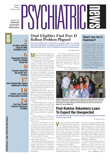While many studies have demonstrated the benefits of marriage in terms of promoting physical and mental health, what happens to couples who engage in verbal spats and power plays for years, maybe decades?
One study, for example, found that unhappily married subjects were 25 times more likely to experience a major depressive disorder than were happily married ones. Another found that among women with coronary heart disease, marital stress worsened their prognosis threefold. And now a new study, published in the December 2005 Archives of General Psychiatry, has found that marital bickering can raise, in the bloodstream, levels of proinflammatory cytokines—that is, the kind of cytokines that sabotages healing instead of promoting it.
The finding is important, the investigators believe, since sustained elevated levels of proinflammatory cytokines have in turn been linked with a plethora of age-related diseases (Psychiatric News, October 21, 2005).
The researchers recruited 42 married couples for their study through newspaper and radio ads, notices posted on campus and in the community, and via referral from other participants. Subjects ranged in age from 22 to 77 years and had been married anywhere from two to 52 years (on average 13 years).
Wound Healing Monitored
The couples then came to the hospital research unit at 7 a.m. on an appointed day, filled out questionnaires about themselves, had blood drawn for cytokine testing, and were administered suction blister wounds, which are an excellent model for studying the effects of early wound healing.
Each couple then engaged in a discussion where each spouse sought social support from the other in changing a personal characteristic. In other words, one spouse was asked to “talk about something you would like to change about yourself,” while the partner was instructed to “be involved in the discussion and respond in whatever way you wish.” Roles were reversed after 10 minutes so that each spouse had the opportunity to play the role of helper.
As the couple engaged in the discussion, the research team observed and assessed their behaviors from outside the room. The instrument used to assess the behaviors was the Rapid Marital Interaction Coding System, which discriminates well between distressed and nondistressed couples.
A few hours later, each subject gave a blood sample so that his or her proinflammatory cytokine levels could be measured. His or her wound was also assessed for healing not just in the hours following the discussion, but also some days later.
At a later date the couples returned to the hospital research unit. Again, they had blood drawn to measure cytokine levels, and again they were given suction blister wounds. After that, each couple discussed a subject on which they hotly disagreed, say, money or in-laws, and tried to resolve it. The research team observed and evaluated their behaviors from outside the room. And once again, each subject gave a blood sample a few hours after the discussion to measure proinflammatory cytokine levels and was monitored over the next few hours and days for wound healing.
The investigators then rated the couples as either low in hostility to each other or high in hostility to each other during the two discussions. Twenty-nine percent were found to be highly hostile to each other. The researchers then compared levels of proinflammatory cytokines in high-hostility couples before and after a social-support discussion with their proinflammatory cytokine levels before and after a contentious discussion. They did the same for low-hostility couples. Finally, they compared the proinflammatory cytokine profiles for both groups.
Hostility Linked to Bad Cytokines
Low-hostile participants produced roughly the same increase in proinflammatory cytokine levels following a conflict discussion as after a social-support discussion. In contrast, the high-hostile participants had relatively greater increases in proinflammatory cytokines following a conflict discussion than a social-support one.
The researchers also compared blister-wound healing in high-hostile couples with that in low-hostile couples. They found that wounds healed more slowly for both groups after a conflict discussion than after a social-support one. But wound healing was especially sluggish in the high-hostile couples.
“We were surprised at how very sensitive wound healing is to even very minor stressful events,” Janice Kiecolt-Glaser, Ph.D., told Psychiatric News. She is chair of medicine at Ohio State University and the study's lead investigator.
The study's findings “have broad implications for health [since] elevated levels of proinflammatory cytokines have been linked to a variety of age-related diseases, including cardiovascular disease, osteoporosis, arthritis, type 2 diabetes mellitus, certain cancers, and frailty and functional decline. Moreover, inflammatory activation can enhance development of depressive symptoms.”
The researchers also pointed out that “couples' fights at home are more negative and last longer than those studied in the laboratory. Unhappy couples are less likely to volunteer for marital research than those who are more satisfied with their spouse. Accordingly, the present data are likely to underestimate the health impact of marital strife.”
The study was funded by the National Institutes of Health and the Ohio State University Comprehensive Cancer Center.
Arch Gen Psychiatry 2005 62 1377
